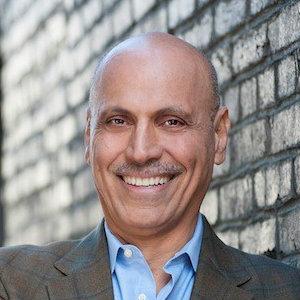LGW FEATURES MEMBER ANDY SHALLAL
Anas “Andy” Shallal is an artist and social entrepreneur. He is the founder of Busboys and Poets, an environment where racial and cultural connections are consciously uplifted. Spaces to feed the mind, body, and soul and where art, culture, and politics take center stage and collide. With 6 locations in the Washington Metropolitan Area, Busboys and Poets has become home for progressives, artists and intellectuals including such notables as Howard Zinn, Cornel West, Alice Walker and Nikki Giovanni to name a few.
Shallal’s businesses are members of the Restaurant Opportunities Center (ROC) and the American Sustainable Business Council (ASBC) focusing on sustainable business and employment practices. Busboys and Poets has been at the forefront of environmental stewardship being one of the first businesses in Washington DC to be 100% wind powered and are at the cutting edge of the local/sustainable food movement winning many awards and recognitions locally and nationally. Shallal has received numerous awards including the Mayor’s Arts Award, Employer of the Year from the Employment Justice Center and the Mayor’s Environmental Award.
Shallal has founded or co-founded several peace and justice organizations and holds leadership positions in numerous others. He is on the board of trustees for the Institute for Policy Studies, Race Forward and a founding member of Think Local First DC, a local business association. He also sits on the board of several arts and peace organizations and was appointed by the Mayor to head the Workforce Investment Council, an advisory board for the Mayor on how to spend workforce development dollars more effectively. Shallal continues to strive to make his hometown of Washington DC a more livable community.
How did you become involved with LGW’s Signature Program?
Robert McCartney and Tony Cancelosi approached me and recruited me heavily to join LGW. I’m glad they did.
Can you describe a truly special LGW Moment from your experience - a connection you made, something you pursued because of LGW, or a distinctive memory?
I was skeptical about the value of LGW. It took me two sessions before I was hooked. I have to say that I have been pleasantly surprised at the folks in the room, the quality of programming, the genuineness of the people. I feel that I can truly call them friends not just associates. I am heartened by the support and love that each member exudes. Their willingness to get out of their way to ensure that everyone feels welcome and valued and part of the conversation.
How would you describe LGW - the alumni, leadership, staff, and overall mission of the organization?
LGW is a great way to experience and connect with the many different facets that make this region unique. I love the fact that many of the folks that are seen as leaders in this region are either members or alumni of LGW. The mission of LGW is squarely aligned with the values that define this region; values of inclusion and diversity and the sense that we are a part of a bigger whole.
Can you give us some background and insight into your personal leadership path – including sources of inspiration and the most important lessons learned?
It’s hard to distil decades of personal growth on one or two sources. There are many sources and people that have influenced my life. My art teacher in middle school, historian Howard Zinn who taught me that change is incremental and takes patience and to enjoy the journey along the way, my speech therapist who taught me to take risks even if it seems foolish. One guiding truth that I follow is not being afraid to fail. I sometimes look forward to failing because it is frequently followed by something better and more exciting. My leadership style is to watch from a distance. I feel that empathy is something that is essential in my style of leadership.
Tell us something most people might not know about you.
The restaurant business is my second career. My first career was medicine, and for a short time, I worked at the NIH as a medical immunologist doing leukemia research. I knew that I was not cut out for the field when I passed out at the sight of blood being drawn from a patient.
How do you envision the future of the region? What about LGW’s role in that future?
The region will continue to grow and prosper; I have no doubt. I do see that an essential part of what LGW can do is to not only give an overview of what the future looks like based on predetermined modeling but to play an active role in ensuring that the region works for everyone, not just those who are educated and well placed. I see LGW being proactive in addressing issues of homelessness, gentrification and housing issues to name a few.
How do your efforts and leadership at your business impact the future of the Greater Washington region?
Busboys and Poets has been at the forefront of many changes that have taken place in the region. We are positioned to be a leader in business and in making the region more sustainable for years to come. We have testified before city councils and government entities for higher wages, paid sick leave, and family leave among other business related issues. We have also been leading a necessary conversation on race and its impact on the future of the region. Part of our mission is to be a place where racial and cultural connections are consciously uplifted; allowing people a chance to interact with people who may be different than them.
